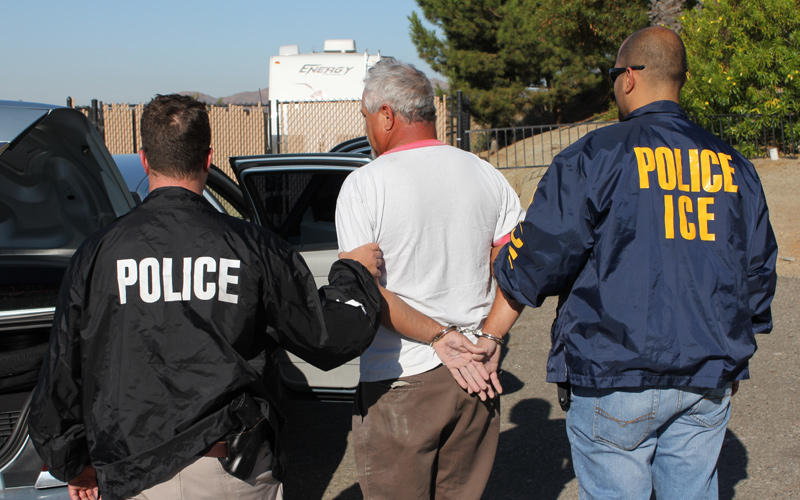

By Steve Pomper
Do state and local lawmakers consider the profound impact it has on law enforcement officers and agencies when they pass laws that conflict with federal law—or local laws that conflict with state laws? Regardless of their ideological motivations, lawmakers need to realize how important it is to facilitate cooperation between law enforcement at all levels of government.
Law enforcement officers share a sense of family, and cooperation between them enhances public safety. It’s unnatural for cops not to work together.
Lawmakers must recognize that rare bond that exists among cops because of the unique nature of the job. A squad-mate once told me her boyfriend bristled at how close she was with her fellow officers. He said he wasn’t close like that with his co-workers.
Of course not. A part of our job is to protect each other up to and including risking our lives. While life-saving anomalies happen in other professions, protecting each other is a major part of every cop’s basic job description—perhaps the most important part.
Earlier this year, a motorist struck and killed a U.S. Border Patrol agent. She’d stopped on a highway to assist Texas State Troopers. This dedication to each other comes naturally for cops regardless of the agency.
To show the significance of that bond, it even extends beyond our borders. Sadly, I’ve had to attend several line-of-duty death police funerals. Not only do cops come from agencies all across the United States but also from Canada. These agencies include the Royal Canadian Mounted Police. Though it’s a sad occasion, that sea of red filling the section where they’ve seated the Canadian Mounties who’ve come to honor an American fallen officer is awe-inspiring.
During my career, I cooperated with federal law enforcement from the FBI, Secret Service, State Department, ATF, ICE, and CBP. From state law enforcement agencies, I assisted—and vice versa—troopers, Liquor Control officers, and Fish and Wildlife officers. And I worked with county sheriff’s deputies and the myriad cops from local mutual aid agencies.
During the 1999 WTO riots in Seattle, I not only worked alongside federal, state, county, and local cops but also with National Guard troops. My point is, though occasional disputes may arise between agencies, an intense fraternity exists among police officers that is invaluable to society.
So, objectively, how can state and local lawmakers not threaten these relationships when they pass laws that attempt to circumvent or nullify federal law? The U.S. Constitution is the Supreme Law of the Land all cops swear to uphold and defend. A federal law endures until Congress changes it, or the U.S. Supreme Court reverses or amends it.
The Supremacy Clause, found in the U.S. Constitution, Article VI, Section 2 mandates the “Constitution and the laws of the United States… shall be the supreme Law of the Land.” When a state or local jurisdiction enact any law that is inconsistent or conflicts with the federal government exercising its constitutional duties, the federal law is prevalent.
Federal supremacy dates back to 1819 when Chief Justice John Marshall ruled on a relevant case. He wrote, “The government of the Union, though limited in its power, is supreme within its sphere of action.”
I don’t like all federal laws either. But, so what? That’s how the rule of law works. And there are official mechanisms to change federal law. If lawmakers ignore those mechanisms and pass conflicting laws, avoidable confusion among and contention between law enforcement agencies and personnel is inevitable.
Some State lawmakers pass these laws despite being aware of federal supremacy. In fact, states invoke their supremacy to remedy conflicts with local laws. It’s important that lawmakers understand the strain they put on the rule of law and how these conflicts affect law enforcement officers. For example, laws that prohibit local cops from cooperating with ICE can’t help but create needless tension.
Let’s say you’re a local cop. You arrest and transport to jail an intoxicated assault suspect who resisted arrest. You don’t ask, but he tells you he’s in the country illegally (remember, he’s drunk). You want to report the suspect to ICE, so they can investigate a possible immigration violation. But your local lawmakers have prohibited it.
You have a genuine public safety concern, but you can’t call anyone else. The feds are in charge of immigration. But a state or local law demands you not cooperate with ICE? Not follow the Constitution. Not do your sworn duty.
How do you think it feels to a cop, knowing that without ICE action the jail may release the suspect back into your neighborhoods? What happens if that illegal alien suspect later kills someone—maybe a cop—or a 14-year-old girl?
Equally bad, let’s say you’re a jail officer. Your job is to keep incarcerated the criminals the police take off the streets—including illegal immigrants. You’re at the booking desk when ICE agents arrive to consult about a case or to check the immigration status of an inmate. But your state or local government prohibits you from cooperating with ICE.
Some officials have even said they will order ICE agents removed from their jails. What does that look like for cops in real life?
Try to imagine how a cop feels when lawmakers pass laws and policies requiring him or her to ignore valid laws—local, state, or federal? Such contrary orders have to affect not only interdepartmental cooperation but also intradepartmental officer morale.
Finally, how does intentionally enacting state and local laws and policies that conflict with federal law tangibly improve public safety?
It doesn’t.
How could it?